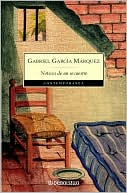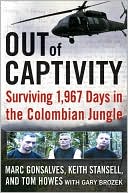Noticia de un secuestro (News of a Kidnapping)
Search in google:
"Antes de entrar en el automóvil miró por encima del hombro para estar segura de que nadie la acechaba. Eran las siete y cinco de la noche en Bogotá. Había oscurecido una hora antes, el Parque Nacional estaba mal iluminado y los árboles sin hojas tenían un perfil fantasmal contra el cielo turbio y triste, pero no había a la vista nada que temer." ..."Era, en efecto, el automóvil de Maruja. Había transcurrido por lo menos media hora desde el secuestro, y sólo quedaban los rastros: el cristal del lado del chofer destruido por un balazo, la mancha de sangre y el granizo de vidrio en el asiento, y la sombra húmeda en el asfalto, de donde acababan de llevarse al chofer todavía con vida. El resto estaba limpio y en orden." Noticia de un secuestro es una obra de investigación periodística, fruto de casi tres años de trabajo, durante los cuales Gabriel García Márquez entrevistó a los secuestrados, a sus familias, así como a todas aquellas personas que intervinieron en las negociaciones para su rescate, y desentrañó todos los pormenores que rodearon a los secuestros. Su relato es un drama real, que se publica en la misma colección que el resto de los reportajes y crónicas realizados por el Premio Nobel de Literatura a lo largo de su carrera como periodista. Publishers Weekly In October 1993, Mauja Pachn and Beatriz Villamizar, the wife and sister of a prominent Colombian politician, were taken hostage by Pablo Escobar, the billionaire don of the Medelln cocaine cartel. The story of their captivity, and of the negotiations that led to their release, is also the story of a legal crisis that turned into a terrorist civil war and, in the last decade, left thousands dead, from the children of Medelln's slums (where people prayed to effigies of Escobar) to soccer stars and presidential candidates. The heart of the struggle, played out daily in Colombia's Supreme Court and the National Assembly, in newspapers, on TV and in the streets: terms of surrender for Escobar and his henchmen, "The Extraditables," whose motto was "Better a grave in Colombia than a cell in the United States." This struggle has been reported to North American readers, notably by Alma Guillermoprieto in her recent collection of New Yorker correspondence, The Heart That Bleeds, but never with such tragic elegance as here, for Nobel laureate Mrquez knows his subjects as friends or acquaintances and at the same time understands them as types, symbols of a national destiny. Their private premonitions, foibles and heroism fascinate him. What emerges from these pages is not just a chronology of the harrowing events of 1993-94, but also a detailed portrait of Colombian society today, in particular of the moneyed intelligentsia (known in Colombia as "the political class") for whom government and the media are still very much a family affair. Nevertheless, Mrquez's calm sympathy reaches beyond these leading families taken prisoner by the war on drugs; he takes a human interest in the foot-soldiers who face certain death in Escobar's serviceand even in Escobar himself, a doomed anti-hero whose "most unsettling and dangerous aspect... was his total inability to distinguish between good and evil." Perhaps the most remarkable thing about this book is its insistence on individual choice between good and evil, pluck and cowardice, at a moment when a lesser writer might see only the drama of a gripping true-crime story, with villains and victims foreordained. 100,000 first printing. (June)








